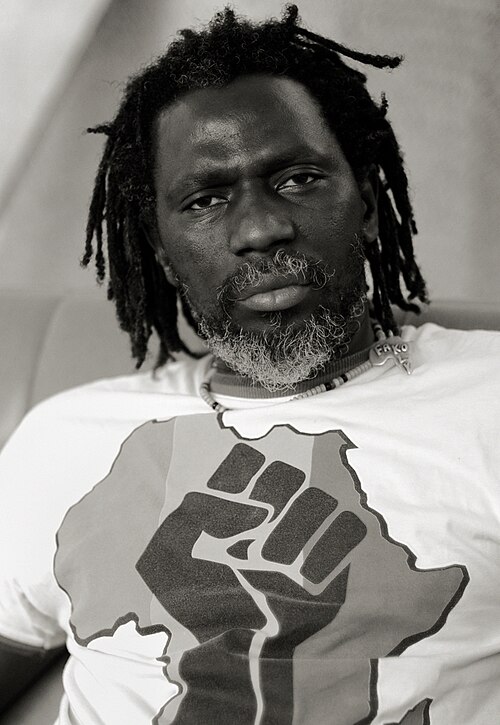In the diverse landscape of African music, artists carve out distinct niches. While global superstars like Nigeria’s Burna Boy conquer international charts and stadiums, the profound resonance of an artist like Ivorian reggae legend Tiken Jah Fakoly in a country like Burkina Faso is rooted in a different soil—that of political consciousness, pan-Africanism, and a direct engagement with the region’s social struggles.
🎤 Tiken Jah Fakoly: The Voice of the Voiceless
Tiken Jah Fakoly is far more than a musician; he is a modern-day griot, using his music as a tool for social and political awakening. His career is built on a foundation of fearless critique and a pan-African vision.
· A History of Political Engagement: From his early album Mangercratie (1996), which criticized the cynicism of politicians in the post-Houphouët-Boigny era in Côte d’Ivoire, Fakoly has consistently “write[n] incisive works on the political environment” . His 2002 album Françafrique was a landmark critique of France’s continued political and economic influence over its former colonies, accusing powers of selling weapons and plundering wealth while feigning surprise at Africa’s instability .
· Exile and Authenticity: Due to death threats stemming from his lyrics, Fakoly has lived in exile in Bamako, Mali, since 2003 . This experience has cemented his status as an authentic, persecuted truth-teller, strengthening his credibility among audiences who feel similarly disillusioned by their own governments.
· The Pan-African Mission: His principal message, as he has stated, is to tell Africans that “Africa is the continent of the future, and that us Africans should be proud because the future is ours” . His songs like Ça va faire dream of a united Africa capable of facing the arrogance of developed nations, and Ouvrez les frontières highlights the injustice of global immigration policies .
🇧🇫 Why Burkina Faso is a Receptive Stage
Burkina Faso, with its own history of political struggle and anti-imperialist sentiment, provides a fertile ground for Fakoly’s message. While a specific performance was not found in the search results, the country’s social and political atmosphere aligns perfectly with his life’s work.
· A Legacy of Revolution: Burkina Faso is the spiritual home of Captain Thomas Sankara, the revolutionary leader whose anti-imperialist and pan-Africanist ideals still inspire many across the continent. Fakoly’s music frequently pays homage to such martyrs; in his song Les Martyrs, he explicitly names Sankara, vowing, “we will forgive but we will never forget” . Performing in Burkina Faso is, in a sense, performing on hallowed ground for his ideology.
· Current Political Alignments: The current leadership in Burkina Faso, following the 2022 coup, has pursued a strongly anti-Western foreign policy, expelling French forces and aligning with Russia . This resonates with the long-standing critiques Fakoly has voiced in songs like Françafrique, creating a natural synergy between his art and the official political narrative. His music provides the cultural soundtrack to this geopolitical shift.
🌍 The Burna Boy Contrast: Different Paths, Different Audiences
The absence of a performer like Burna Boy from such a context is not a mark of failure but a reflection of a different artistic and commercial focus. The following table contrasts their core orientations:
Burna Boy’s 2025 “Roots & Glory” world tour, featuring sold-out stadiums from London to New York, underscores his status as a global touring powerhouse . His music, while often celebrating African heritage, is engineered for mass global appeal, blending Afrobeats, pop, and dancehall. This does not make his art less valuable, but it operates on a different axis—one of cultural dominance and commercial crossover rather than targeted political mobilization.
✊️ A Movement for Côte d’Ivoire and West Africa
For Côte d’Ivoire and West Africa, Tiken Jah Fakoly represents a crucial thread of political and social consciousness. In a region where countries like Côte d’Ivoire are navigating tense elections and the threat of violence , his music offers a narrative of resilience and self-determination.
He embodies a movement that refuses to forget history and relentlessly questions power. For a generation of West Africans, he is a teacher whose “course of history” provides a framework for understanding their present challenges. His ability to perform in a politically volatile nation like Burkina Faso is a testament to the fact that his movement is not just about music; it is a vital part of the ongoing conversation about identity, sovereignty, and the future of the African continent.
In conclusion, the stage in Burkina Faso is more readily available to Tiken Jah Fakoly not because of commercial metrics, but because his art and the nation’s social atmosphere are in profound alignment. He doesn’t just perform concerts; he provides anthems for a political struggle, making his voice uniquely significant in the West African landscape.

Leave a Reply